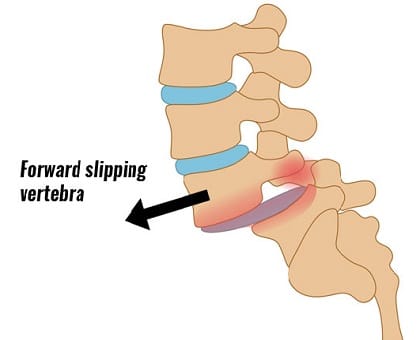What is Spondylolisthesis?
Spondylolisthesis is defined as a slip of one vertebral body relative to an adjacent vertebral body caused for the breakdown of the cartilage between the vertebra. This condition causes misalignment and narrowing of the spinal column, known as spinal stenosis, resulting in pressure on the nerves, thus causing pain in the buttocks or legs.
This spinal condition most commonly presents as a degenerative disease in adults but may be present in adolescents as a result of deformity or trauma. One of the most common symptoms of Spondylolisthesis is mild to moderate back pain. If the slip is compressing a nerve, leg pain often develops.

Spondylolisthesis Symptoms
A change in the position of the vertebra can lead to back pain. Nerve compression may occur as the condition worsens, resulting in leg pain. The most common Spondylolisthesis symptoms:
- Lower back pain
- Leg pain and numbness may develop if there is nerve compression
Spondylolisthesis Causes
Adults
- Arthritic changes
- Disc degeneration
- Pars defect
Adolescents
- Trauma due to athletic activities
- Congenital deformity
- Isthmic Spondylolisthesis
